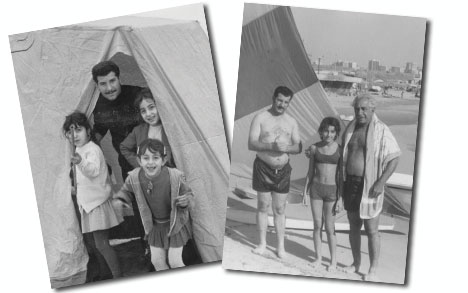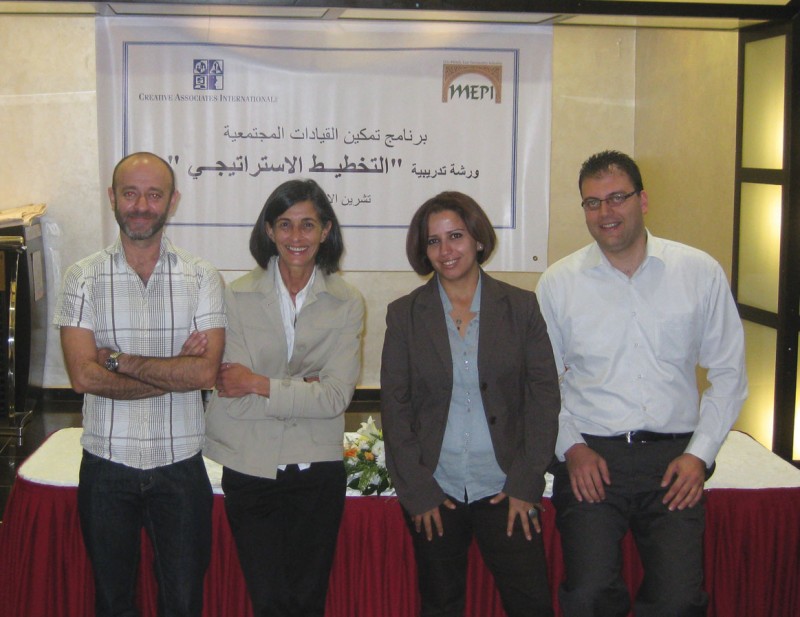[vc_row][vc_column][vc_column_text]
WEST BANK:
Ban Saraf – In Pursuit of the Just King
[/vc_column_text][/vc_column][/vc_row][vc_row][vc_column width=”2/3″][vc_column_text] It’s a sunny, breezy afternoon in Beirut. It is 1970 and the city is bustling with passers-by and the sound of various regional dialects. Business is booming and Beirut is seen as the hope of the Middle East. On this particular afternoon, there is no hint of the encroaching storm that will in a few years fracture the very foundations of the city. The Mediterranean Sea that borders the city’s coastline is glistening under the afternoon sun. A man about sixty walks along the seaside with a small bright eyed little girl, as they often do. While they stroll, the man recounts for the small girl the story of the Just King. The storyteller is captivating and the child listens intently. Photo Bio.
It’s a sunny, breezy afternoon in Beirut. It is 1970 and the city is bustling with passers-by and the sound of various regional dialects. Business is booming and Beirut is seen as the hope of the Middle East. On this particular afternoon, there is no hint of the encroaching storm that will in a few years fracture the very foundations of the city. The Mediterranean Sea that borders the city’s coastline is glistening under the afternoon sun. A man about sixty walks along the seaside with a small bright eyed little girl, as they often do. While they stroll, the man recounts for the small girl the story of the Just King. The storyteller is captivating and the child listens intently. Photo Bio.
“I will always remember the stories he used to tell me about the Just King, probably it was from One Thousand and One Nights. From these stories I always realized I had to see the Just King within a just society or community,” said Ban Saraf, recalling her late father whom she describes as an ‘extremely pragmatic and spiritual person’ whose influence on her remains lasting. Growing up with Conflict.
Saraf, now heads a U.S. State Department-funded Middle East Partnership Initiative project in the West Bank and Jerusalem providing direct rapid-response support to Palestinian civil society organizations. “Our project is not a huge grant, it’s not a huge budget, however, especially in the West Bank, a lot of people are used to having sponsored infrastructure, roads, schools and what have you, they’re used to them. So, while there are huge road openings, our small lab literally in a small village where they have no computer access, no meeting place, becomes the source for a great deal of change,” said Saraf. “What we provide, and I am honored to do that, are the tools, including mentorship or in-kind grants.” In other words, the MEPI approach has enabled the community to make use of their ideas and move forward. “And, we’ve seen that in many communities, at many levels.” Thoughts on Father.
Neither a rebel nor conformist, Saraf is a realist with good common sense. That’s one reason she often encourages men to join training sessions and workshops. “The idea of gender should not be confused with women. Gender is understanding the level of conflict between men and women, and also the level of harmony, dependence and codependence. At one training, one man actually left the training, and I quote him literally, ‘he said, I didn’t know women had such a sense of leadership.’ He didn’t know, he wasn’t being sexist – he simply didn’t know.” Gender.  In another example of MEPI’s success under Saraf, she refers to a 20-year old men’s club where women never went. “Suddenly, the club got a computer lab through Creative’s award, and some women started going there out of pure desperation, on off hours. Within six months, they, the women, started seeking membership and started a dialogue about the reason the club did not have a partnership with them. Now, the club is thinking of changing its name to the Women and Men’s Club, and that happened not because it was a criteria that we requested of them, but because they wanted it.”
In another example of MEPI’s success under Saraf, she refers to a 20-year old men’s club where women never went. “Suddenly, the club got a computer lab through Creative’s award, and some women started going there out of pure desperation, on off hours. Within six months, they, the women, started seeking membership and started a dialogue about the reason the club did not have a partnership with them. Now, the club is thinking of changing its name to the Women and Men’s Club, and that happened not because it was a criteria that we requested of them, but because they wanted it.”
Born in Iraq and the youngest of a family with 12 children, Saraf grew up mostly in Lebanon after fleeing the Saddam Hussein regime, when she was 8-years old. She came to the U.S. in her 20s and after earning a master’s degree in Culture and Society from Georgetown University, she founded a software company with her sister in Northern Virginia. “Unfortunately, the Iraq war happened and I watched it on TV like everybody else. Until that point, honestly and truly, I was established in the Washington area, I never thought I would do this work.” New Opportunities.
Saraf launched her development career during the reconstruction period in Iraq in 2003. Since then, she has created a niche for herself working in conflict and post conflict areas to resolve conflict in a more sustainable way through civil society. “It’s nothing that I planned, it’s very beautiful, I always knew there was a place that I was going to go to,” said Saraf referring to her current work in the West Bank and the development field in general. Working in the West Bank.
Over the years, she’s taken on some tough assignments working with communities and groups in volatile environments. She recalls a session she held after the recent local elections were cancelled in June. Feelings were high with a barrage of verbal exchanges as to who was wrong, who was right.
Though petite, Saraf is commanding and told those assembled that at 48-years old, she was probably the oldest in the room and so deserved to be heard. They accepted. “I told them rather than fuel tensions about having to make a point of who is right or wrong, the objective, to start with, was to hear the other. They understood that they had a space to speak. In the evaluation that followed, they noted that dialogue does not negate reality. Honestly, what works is common sense and truly appreciating each group’s point of view while keeping the real objectives in mind. And the objective can’t be rhetorical and just seek “buy-in,” that’s cliché; it has to come from members of the community. That’s what’s doable.”
As proof that the community has embraced the goals of the West Bank project, Saraf says that in some cases grantees put the Creative and MEPI logo at the front of their computer lab, which MEPI supported. “We never ask for that.” Understanding a Region.
The morals and lessons from the stories she remembers from her walks along the shore with her father remain with Saraf to this day. She wisely points out that development is a long and continuing process, “In a sense there is no end to development, there is only progress. There is development within the NGO and the community it serves, because there are always new demands that come about.”
Click to download video[/vc_column_text][/vc_column][vc_column width=”1/12″][/vc_column][vc_column width=”1/4″][vc_widget_sidebar sidebar_id=”sidebar-primary”][/vc_column][/vc_row]